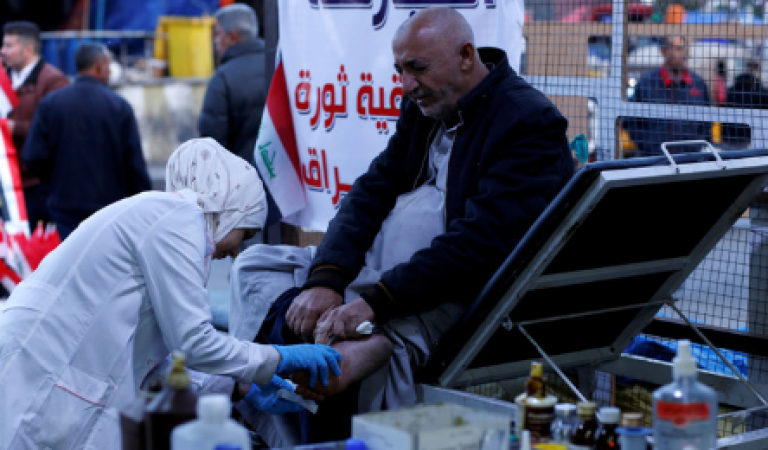
Manila: In a promising move towards enhancing nursing education and fostering international collaboration, Iraq has expressed its interest in training its nurses at Philippine medical schools. A delegation from the Iraqi Ministry of Higher Education and Scientific Research engaged in discussions with Philippine officials in Manila on Wednesday to explore the possibility of this innovative partnership.
The delegation, led by Osama Esmaiel Al-Mushhadany, the President of Ninevah University, conveyed Iraq's eagerness to draw from the Philippines' extensive experience in nursing education. Al-Mushhadany acknowledged the Philippines' distinguished reputation for producing high-quality nurses and expressed his country's interest in training Iraqi faculty members from universities.
"We know that the Philippines is one of the top-ranked countries in the quality of nurses," Al-Mushhadany stated. "Therefore, we asked if we can train our faculty members from Iraqi universities for training and to observe here in the Philippines."
Also Read: Asia Cup 2023: India-Pakistan Showdown Promises Fireworks
The Philippine side warmly received the proposal, with the Department of Foreign Affairs expressing openness to exploring avenues to strengthen educational cooperation between the two nations.
The envisioned partnership holds the potential for multifaceted collaboration, which could encompass:
Student Exchange Programs: Iraqi nursing students could travel to the Philippines to pursue their education, benefiting from the Philippines' expertise in nursing education and healthcare training.
Faculty Training: Iraqi nursing faculty members may have the opportunity to observe and receive training at Philippine medical schools, further enhancing their teaching skills and knowledge.
Research Initiatives: The partnership could foster joint research projects, allowing researchers from both countries to collaborate on cutting-edge healthcare and nursing research.
Academic Resource Sharing: The exchange of academic materials and resources could enrich the educational experience for students and faculty on both sides.
The potential collaboration is poised to be mutually advantageous. Iraq stands to benefit from the Philippines' well-established nursing education infrastructure, while the Philippines may see increased demand for its nursing expertise and educational programs.
Although the partnership is still in its preliminary stages, optimism surrounds its prospects. Both Iraq and the Philippines are eager to formalize the arrangement, recognizing the potential for strengthening their bilateral relations through educational cooperation.
Memorandum of Understanding (MOU): The Iraqi delegation has presented a draft MOU outlining the terms and conditions of the partnership. The MOU will address critical aspects such as the duration of training programs, the number of students and faculty members involved, and program costs.
Also Read: Russia Deploys Sarmat ICBM: Putin's Warning and Global Implications
Review and Finalization: The Philippine side has expressed its willingness to review the MOU and provide feedback. The finalization of the MOU is expected to take place in the coming weeks.
Commencement of Partnership: The partnership is anticipated to commence in early 2024. The first cohort of Iraqi nursing students will embark on their educational journey in the Philippines.
Duration: The partnership is envisioned to span five years, providing ample time for the training and education of numerous Iraqi nursing students and faculty members in the Philippines.
This proposed partnership marks a significant stride forward for both the Philippines and Iraq. It has the potential to strengthen diplomatic ties and elevate the quality of nursing education in Iraq. Moreover, it reflects the broader global trend of nations collaborating to bolster their healthcare and educational capacities, ultimately benefiting citizens and healthcare systems alike.
The move by Iraq to explore training opportunities for its nurses in the Philippines reflects a broader aspiration to enhance the quality of healthcare and medical education within the country. Iraq, like many nations, recognizes the critical role that well-trained nurses play in delivering effective healthcare services.
Challenges in Nursing Education: Iraq faces several challenges in its nursing education sector. These include the need to train a sufficient number of skilled nurses to meet the healthcare demands of its population, improving the quality of nursing education, and ensuring that nursing curricula are aligned with international standards.
International Collaboration: Collaborating with a country renowned for its nursing education, such as the Philippines, presents a unique opportunity for Iraq to tap into a wealth of knowledge and experience. This collaboration can facilitate knowledge transfer, capacity building, and the adoption of best practices in nursing education.
Benefits of Training Abroad: Sending nursing students and faculty members abroad for training can expose them to diverse clinical settings, teaching methodologies, and healthcare systems. This exposure can contribute to a more well-rounded and globally competent nursing workforce.
Also Read: G20 Summit 2023: Joe Biden and Narendra Modi to Hold Bilateral Meeting on Sept 8
Enhanced Patient Care: Ultimately, the partnership between Iraq and the Philippines has the potential to lead to improved patient care in Iraq. Well-trained nurses are crucial for delivering high-quality healthcare services, and investments in nursing education can yield significant dividends for the health and well-being of the population.
In conclusion, the prospect of Iraq training its nurses in Philippine medical schools represents a forward-looking initiative that holds promise for both countries. It signifies a commitment to strengthening nursing education, promoting international collaboration, and ultimately enhancing healthcare services and patient outcomes. As the partnership progresses, it may serve as a model for other nations seeking to bolster their healthcare and educational capacities through innovative international cooperation.